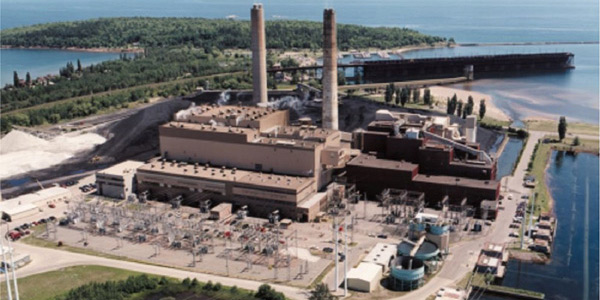By Amanda Durish Cook
Michigan’s Upper Peninsula will get its own utility, two new generating plants — and maybe additional transmission — following actions by regulators and MISO officials seeking to address the region’s reliability and cost concerns.
MISO said Wednesday it has committed to a study examining the benefits of transmission connection between Ontario and Michigan’s Upper and Lower Peninsulas. The announcement followed the Michigan Public Service Commission’s Dec. 9 order approving the creation of the Upper Michigan Energy Resources Corp. (UMERC) (Case No. U-18061).
The company will be formed from the electric and gas distribution assets of Wisconsin Electric Power Co. (WEPCo) and Wisconsin Public Service — both subsidiaries of Milwaukee-based WEC Energy Group — and will begin serving about 40,000 Upper Peninsula customers Jan. 1.
The terms of UMERC’s creation were negotiated under a settlement signed by the companies, PSC staff, Attorney General Bill Schuette, Tilden Mining, Cloverland Electric Cooperative and others.
No Cost Sharing
PSC spokeswoman Judy Palnau said the new utility will avoid cost-sharing with Wisconsin, as it will be regulated by Michigan alone.
The utility will be the owner and operator of two new proposed generating facilities expected in operation by 2019, one year before the Presque Isle plant in Marquette shutters. UMERC will depend on power purchase agreements with WEPCo and WPS until the new generation is operating.
The commission said rates and service for Upper Peninsula customers should not be adversely affected by the changes.
“The transition to UMERC for ratepayers will be as seamless as possible. The commission observes that the personnel currently responsible for management, communications, regulatory compliance and customer relations will not change. Moreover, the PPAs will offer reasonable and affordable rates that may indeed, as the record indicates, be slightly lower than recent rates,” the order said. “The commission is also persuaded that the settlement protects ratepayers from any rate impact associated with the termination of Tilden as a customer, whether voluntary or involuntary. The settlement represents the beginning of the process of ensuring that reliable and affordable power is available over the long term in the UP.”
WEC spokeswoman Amy Jahns said the new utility would not have employees “specifically” assigned to it; instead, WEC’s office in Iron Mountain, Mich., and its WPS office in Menomonee, Mich., “will provide services to support the new utility.”
Jahns said the company is awaiting approvals regarding UMERC from the Wisconsin Public Service Commission and FERC.
Conditions Attached
The PSC’s approval came with several conditions, including that Michigan PSC staff receive UMERC’s yearly capital reports and operations plans and have access to all of WEPCo’s books and records concerning the 431-MW Presque Isle plant when the commission reviews the plant for decommissioning and final cost recovery from ratepayers.
WEPCo and WPS are also barred from changing any of the terms of their PPAs until Jan. 1, 2020. The companies also cannot request FERC to shift “any costs to UMERC customers that are currently shared between Wisconsin and Michigan.”
UMERC plans to build two natural gas-fired plants totaling 170 MW in the Upper Peninsula to provide power in the absence of the Presque Isle plant. WEC will seek permission from the PSC to build the plants next year. (See Upper Peninsula Ratepayers to Seek FERC Probe of Billing Fraud.)
PSC staff and Schuette supported the utility’s creation after the PSC obtained additional information in November on whether the proposal would have an adverse impact on customer rates.
Reliability and costs have long been concerns in the sparsely populated Upper Peninsula. Until recently, the area was home to a trio of system support resource agreements with MISO that kept retiring coal units online. Last month, FERC ruled that MISO and American Transmission Co. could reconfigure the western Upper Peninsula transmission system into two load pockets to end the last of the three SSRs. (See MISO Allowed to End White Pine SSR.)
MISO Agrees to Michigan Reliability Studies
At today’s Planning Advisory Committee meeting, MISO committed to a pair of reliability study requests submitted earlier this year by Michigan officials.
One will examine the benefits of transmission between Ontario and Michigan. The second will evaluate resource adequacy in MISO’s Local Resource Zone 7 in Lower Michigan under a scenario without either the Palisades or Fermi nuclear plants. Earlier this month, Entergy and Consumers Energy announced they intend to mothball the Palisades nuclear plan in southwestern Michigan on Oct. 1, 2018. (See Entergy, Consumers Announce Closure of Palisades Nuke.)
The studies were requested this summer by Michigan Gov. Rick Snyder, who asked the RTO to determine whether transmission linking northern Michigan to Ontario could improve reliability and reduce costs. (See Michigan Asks MISO to Study Tx Links to Ontario.)
“Generally when we get a request from a state, we try to be responsive as we can because we do believe that’s part of our role,” MISO Director of Planning Jeff Webb said.
MISO engineer Adam Solomon said the first phase of the studies are already underway and expected to be completed as part of the 2017 Transmission Expansion Plan’s batch of studies using Electric Generation Expansion Analysis System (EGEAS) modeling. Solomon said while the studies will “kind of overlap MTEP 17, [they are] not necessarily contained within.”
MISO Director of Regional and Economic Studies John Lawhorn said that although the studies will be treated separately, they are related to Michigan’s reliability concerns. “The results of one study will influence the other,” he said.
Lawhorn said the second phase of the studies, a transmission analysis, would begin early next year.





